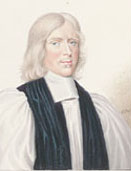
Humphrey Prideaux was a Cornish churchman and orientalist, Dean of Norwich from 1702. His sympathies inclined to Low Churchism in religion and to Whiggism in politics.

Bangor Cathedral is the cathedral church of Bangor, Gwynedd, Wales. It is dedicated to its founder, Saint Deiniol.

Ellis Wynne was a Welsh clergyman and author. He is remembered mainly for one of the most important and influential pieces of Welsh-language literature, Gweledigaetheu y Bardd Cwsc.

William Lloyd was an English divine who served successively as bishop of St Asaph, of Lichfield and Coventry and of Worcester.

John Wynne was Bishop of St Asaph (1715–1727) and of Bath and Wells (1727–1743), having previously been principal of Jesus College, Oxford (1712–1720).

Richard Smallbrooke was an English churchman, Bishop of St David's and then of Lichfield and Coventry.
This article is about the particular significance of the decade 1700–1709 to Wales and its people.
John Ellis was a Welsh priest and antiquarian.
Richard Lucas was a Welsh clergyman and writer of devotional works.
Edward Wynne of Plas Bodewryd, Bodewryd, Anglesey, was a Welsh lawyer and landowner, Fellow of Jesus College, Oxford, an advocate at Doctors' Commons, and Chancellor of the Diocese of Hereford (1707–55) who has been regarded as "undoubtedly, one of the chief men of Anglesey in the first half of the 18th century."
Humphrey Lloyd was Bishop of Bangor from 1674 until 1689.

Robert Morgan was a Welsh Bishop of Bangor.
Bishop Lloyd may refer to:
William Saywell (1643–1701) was an English churchman and academic, known as a controversialist, archdeacon of Ely, and Master of Jesus College, Cambridge.
This article is about the particular significance of the year 1712 to Wales and its people.
This article is about the particular significance of the year 1701 to Wales and its people.
Francis Lloyd was a Welsh Anglican priest.







